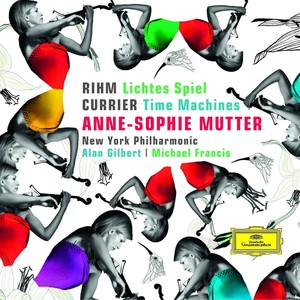
Rihm: Lichtes Spiel / Currier: Time Machines
- 流派:Pop 流行
- 语种:其他
- 发行时间:2011-09-05
- 类型:录音室专辑
- 歌曲
- 时长
简介
Anne-Sophie Mutter专辑介绍:It’s hard to get a handle on Wolfgang Rihm, in large part because he is so enormously prolific, and his music spans the spectrum from ripe post-Schoenberg Romanticism to abrasive post-Darmstadt angst. Is he a closet conservative masquerading as a postmodernist? An arch-avant-gardist ironically distorting classical conventions? A conscientious conceptualist with a vision that embraces the past and recontextualizes it for the present? Hard to say, but it’s a good sign that his music forces us to ask questions, to confront our expectations and prejudices. It’s not for passive listening. I very much like the phrase that Robert Carl used in describing Rihm’s music in Fanfare 30:3, “nostalgic modernism,” which I take to mean not that the tenets of modernism are out of date and obsolete, but that Rihm views them through a kind of dreamlike distancing, an idealism that desires and strives for a historical/cultural continuity of meaning and value, while at the same time recognizing the irony of such a viewpoint (vis-à-vis the philosopher/critic Adorno’s belief that beauty is impossible after Auschwitz), ultimately creating music in a strange blend—sometimes collision—of styles, so that nothing valuable is lost over the inevitable course of “progress.” (The poet e.e. cummings once wrote, “Progress is a comfortable disease.”) In this way, it makes sense that, at least in works like Lichtes Spiel (Light Games) and his previous commission for Anne-Sophie Mutter, Time Chant (also recorded on DG), Rihm is seen as a contemporary extension (and not merely imitator) of Mahler, Berg, and Bartók. In Fanfare 17:1, James H. North felt that Time Chant was “Rihm’s most easily accessible score.” Lichtes Spiel is cut from the same cloth; both are taut, fragile threads of violin melody that rise and fall, gradually unraveling in spite of unexpected complications. Rihm is deft at creating a sustained atmosphere that may express mystery, longing, regret, or tense anticipation; in this case the violin line is less agitatedly chromatic, the lyrical nuances are smoother, gentler, cushioned by sympathetic strings and winds, interrupted briefly by a scherzo-like episode, only to come to a tranquil conclusion. Mutter plays like an angel, with a ravishing tone and absolute control, confident that this music is a thing of beauty. The other major work on this release is the violin concerto by Sebastian Currier, Time Machines . Mutter and Currier also had a previous connection, the violinist having performed some of the young (b.1959) composer’s chamber music. The concerto was apparently originally written with a more extravagant, virtually unplayable orchestral component, but even in this revised version there are plenty of fireworks, including judicious but jolting percussion. Currier likes to contrast extreme speeds, and within the seven movements the violin is either scurrying about zestfully or taking a moment of repose to offer a bit of wistful cantabile or playfully banter with small groups of instruments. Though the piece comes across more as a suite than a conventional concerto—the deathly serious closing movement seems a bit at odds with what’s come before—it’s a vibrant showpiece for Mutter nonetheless. The remaining two pieces are duos for violin and bass. The Penderecki seems like an afterthought, or a filler—it’s five minutes of give-and-take, the two instruments alternating and intertwining folkish melodies with a few rhythmic echoes of L’Histoire du Soldat for spice, but doesn’t really add up to much. Rihm’s Dyade is, as expected, something more, perhaps a movement from an unfinished larger work, with the violin restlessly wandering through a labyrinth of moods, as the bass shadows, supports, cajoles, and provokes alongside. The musicianship at work here, in each of these challenging pieces, is amazing. The New York Philharmonic, under both conductors, sounds fresh and incisive, and Roman Patkoló is a virtuoso bassist. Mutter is at the top of her game. In fact the only complaint I have is the abominable artwork, which depicts multiple Mutters looking like some kind of mutant wasp. Ugh. Look past the cover, listen to the music, and discover what these scores have to offer. --Art Lange, FANFARE Works on This Recording 1. Lichtes Spiel by Wolfgang Rihm ■ Performer: Anne-Sophie Mutter (Violin) ■ Conductor: Michael Francis ■ Orchestra / Ensemble: New York Philharmonic 2. Time Machines by Sebastian Currier ■ Performer: Anne-Sophie Mutter (Violin) ■ Conductor: Alan Gilbert ■ Orchestra / Ensemble: New York Philharmonic ■ Period: 21st Century ■ Written: 2007 3. Duo concertante by Krzysztof Penderecki ■ Performer: Anne-Sophie Mutter (Violin), Roman Patkoló (Double Bass) 4. Dyade by Wolfgang Rihm ■ Performer: Anne-Sophie Mutter (Violin), Roman Patkoló (Double Bass)







